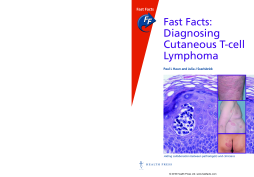
Additional Information
Book Details
Abstract
Cutaneous T-cell lymphoma (CTCL) is one of the ‘great mimickers’. To be certain of the diagnosis, there must be clear correlation between the pathological and clinical findings, making collaboration between clinicians and pathologists essential. Knowing the patient's history, lesion description and diagnostic work-up will help the pathologist make a more informed decision with respect to the histopathology under the microscope. Likewise, understanding the terminology used in the pathology report will improve the clarity of the clinician’s diagnosis.
Fast Facts: Diagnosing Cutaneous T-Cell Lymphoma is designed to help primary care providers, dermatologists and pathologists speak the same language. With over 100 superb clinical and pathological images, this concise, practical handbook will ensure clear communication with respect to the clinical presentation, histopathology and immunophenotyping of:
early and advanced mycosis fungoides and its variants
Sézary syndrome
other non-mycosis fungoides CTCLs.
It is therefore essential reading for all pathologists, non-specialist clinicians and dermatology trainees.
Table of Contents
| Section Title | Page | Action | Price |
|---|---|---|---|
| Fast Facts: Diagnosing Cutaneous T-cell Lymphoma | 1 | ||
| Title page | 2 | ||
| Copyright page | 3 | ||
| Contents | 4 | ||
| Introduction | 6 | ||
| List of abbreviations | 7 | ||
| CHAPTER 1: Classification, epidemiology and etiology | 8 | ||
| CHAPTER 2: Clinical presentation and differential diagnosis | 17 | ||
| CHAPTER 3: Pathology and diagnosis of mycosisfungoides and Sézary syndrome | 33 | ||
| CHAPTER 4: Pathology and diagnosis of non-mycosisfungoides CTCL | 60 | ||
| CHAPTER 5: Staging and prognosis | 83 | ||
| Useful resources | 89 | ||
| Index | 91 | ||
| Back cover | 98 |
